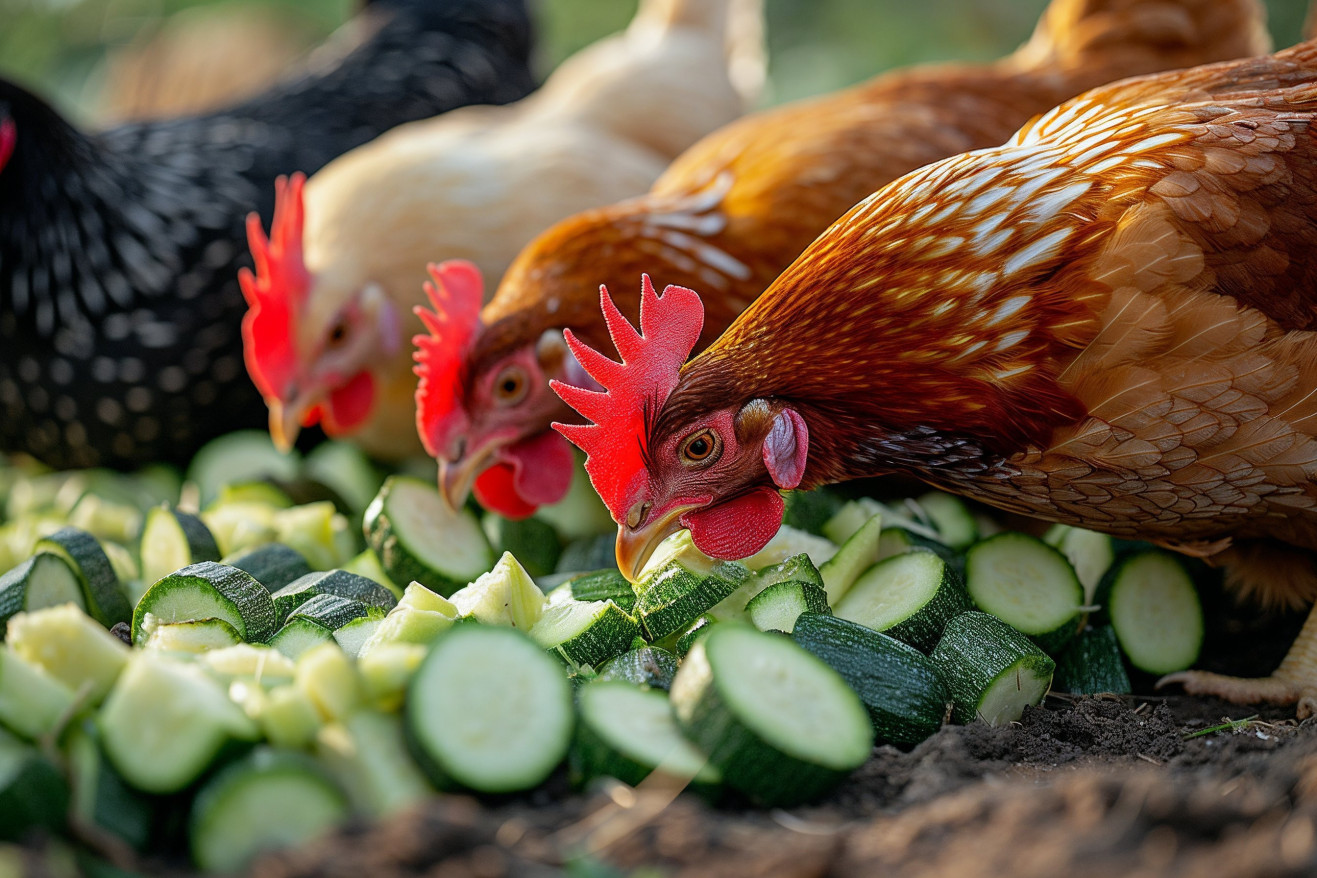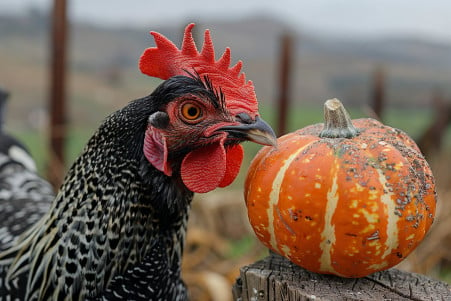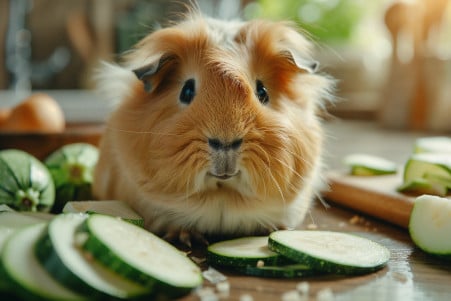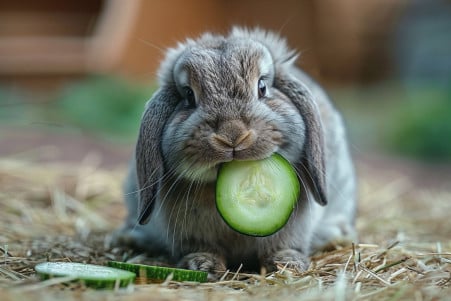Can Chickens Eat Zucchini? Nutritional Benefits & Feeding Tips
7 February 2024 • Updated 6 February 2024

If you grow zucchini in your garden, you may be wondering if you can share this tasty squash with your backyard chickens. The good news is that you can feed zucchini to your chickens. Zucchini is a great source of hydration and is packed with important nutrients like vitamins A and C, and potassium.
However, make sure you only feed raw zucchini to your chickens in moderation, ideally once or twice a week, as part of a well-rounded diet that includes a variety of other foods.
This article will cover insights from veterinarians and nutritional analyses to explain the role of zucchini in a chicken’s diet. We will also explore information from agricultural research and real-world feeding recommendations to learn more about how zucchini can help keep your feathered friends healthy and happy. Find out the advantages and potential pitfalls of feeding your backyard flock zucchini so you can make sure they are eating the best diet possible.
Can chickens eat zucchini?
Zucchini Is a Healthy Treat for Your Birds
Zucchini is a type of summer squash and, in addition to being a healthy food for humans, it can also be a healthy treat for chickens. According to Forbes Health, zucchini is packed with important nutrients like vitamins A and C, potassium, phosphorus, and magnesium, all of which are important for chickens’ vision, immune systems, and bone health.
Meanwhile, Healthline pointed out that zucchini has a high water content. This can be especially helpful in keeping chickens hydrated. Hydration is important for chickens because it helps them regulate their body temperature and stay healthy. Zucchini can help ensure that chickens get the water they need, especially when it’s hot outside or when chickens are reluctant to drink water.
In addition, WebMD reported that zucchini is high in antioxidants like zeaxanthin and lutein, which can help protect chickens’ cells and support their eye health. Eating these antioxidants can also help chickens fight off diseases.
Finally, zucchini is high in fiber, which can help support chickens’ digestion and ensure that their digestive systems work properly. Because it’s high in fiber, zucchini can help prevent chickens from becoming constipated, which makes it a great addition to their diet. A healthy digestive system will help chickens absorb the nutrients they need from their food, which will help them stay healthy.
Healthy Feeding: Zucchini in a Chicken’s Diet
While chickens can benefit from eating zucchini, it’s important to feed it to them in moderation. Evergreen Acre suggests feeding zucchini to your chickens once or twice a week to ensure they don’t eat too much and fill up on it instead of their regular feed.
To feed it to your chickens, cut the zucchini in half lengthwise so they can eat the soft flesh and seeds. This is the method Better Hens & Gardens recommends, and they also note that zucchini seeds can act as a natural dewormer.
When you’re preparing zucchini for your chickens, New Life On A Homestead says to make sure to cut off the woody end and chop it up so your chickens can eat it without choking. This is especially important for bantams and other small chickens or chickens that are weak or sick.
Also, make sure the zucchini you’re feeding your chickens doesn’t have any harmful additives like salt, sugar, butter, or oils. If you’re feeding them store-bought zucchini, make sure to wash it well to remove any pesticides, and consider buying organic.
It’s important to feed your chickens a varied diet to ensure they get all the nutrients they need. Zucchini should be fed in addition to a nutritionally complete feed, not as a replacement for it.
As a treat, zucchini can help with environmental enrichment by encouraging your chickens to peck and forage, which can help keep them physically and mentally stimulated and healthy. As long as you follow these guidelines, zucchini can be a healthy and refreshing addition to your chickens’ diet.
Formulating a Well-Balanced Diet for Chickens
In order to stay healthy and produce quality products, chickens need a diet that includes proteins, carbohydrates, and fats. Proteins are used to build tissues, carbohydrates are used as an energy source, and fats are used for energy storage and nutrient absorption.
Dr. Jacquie Jacob of the University of Kentucky explains that each of these components has a specific role in the development of poultry, including bone, muscle, and feather growth, as well as egg production.
Vitamins and minerals are also essential, especially for laying hens and growing chicks. According to the UGA Cooperative Extension, vitamins and minerals are used for bone growth, metabolic processes, and maintaining overall health. Laying hens have an increased need for calcium to support eggshell formation, while growing chicks need a well-balanced diet to ensure proper growth.
Water, which is often the most forgotten nutrient, is important for temperature regulation and digestion. The water in zucchini can help supplement this need, allowing chickens to get extra hydration and meet their water requirements, especially in hot weather or for birds that don’t drink enough.
It’s important to meet these specific nutritional needs because different breeds and ages of chickens, including layers, broilers, and chicks, have different nutritional needs. For example, the Alabama Cooperative Extension System explains that broilers are bred for fast growth and, as a result, need a higher protein diet than layers.
By understanding these differences, farmers can make sure that their chickens are getting the right diet for their stage of life and purpose, which in turn will help them stay healthy and productive.
Be Careful: Cucurbitacins in Zucchini Can Be Dangerous to Chickens
While zucchini is safe and healthy for chickens, it’s important to know about cucurbitacins, a group of natural chemicals that can be harmful. Cucurbitacins are bitter-tasting compounds that plants produce as a natural defense mechanism.
If consumed in large quantities, cucurbitacins can cause gastrointestinal problems in both humans and animals. The Ministry for Primary Industries warns that zucchini with a strong, unpleasant odor or a very bitter taste is likely to have higher levels of cucurbitacins and should be avoided.
Cases of toxic cucurbitacin levels in zucchini have been reported on PubMed, which means that it’s important to be careful when feeding zucchini to chickens. In fact, there have been cases of people getting sick from eating zucchini that contained cucurbitacins, according to Food Safety News, which recommends that gardeners taste zucchini from their garden for bitterness before eating it.
To reduce the risk of cucurbitacin poisoning, it’s important to buy zucchini from reputable sources and carefully inspect it before feeding it to your chickens.
Home gardeners should also be careful about using saved seeds, as they may inadvertently be more likely to produce zucchini with higher levels of cucurbitacins.
In addition, make sure to remove uneaten zucchini from your chickens’ living area to prevent it from rotting and attracting pests. This will help ensure that your chickens’ living area is clean and safe. If you take these steps, you can feed your chickens zucchini without worrying about the potential dangers.
Zucchini’s Effect on Egg Production and Quality
What a chicken eats has a big impact on how many eggs she lays and the quality of those eggs. As a hydrating food, zucchini can help with a chicken’s overall health, which is directly related to her ability to lay eggs.
A study in ScienceDirect found that the right balance of dietary protein is important for hens to maintain their body weight and egg weight, which in turn helps them lay more eggs and be more efficient in doing so.
Zucchini’s water content also helps with hydration, which is important for egg quality. A well-hydrated hen is more likely to lay eggs with strong shells and healthy albumens, both of which are important for egg quality. Another study published in PMC found that changes in a hen’s diet’s energy and protein levels could change the weight of the eggs she lays, which suggests that adding nutrient-dense foods like zucchini could help improve egg production.
In addition, a study in Scientific Reports found that changes in a chicken’s diet, including changes in the protein source, could change the quality of the eggs she lays, including the fatty acid composition in yolk lipids and lysozyme activity in albumen.
By adding zucchini to the chickens’ diets as a way to add extra nutrients, such as antioxidants and minerals, farmers may be able to get the most out of their flocks in addition to ensuring they have a balanced diet.
With so many different dietary requirements for chickens, adding zucchini and other vegetables to their diets can help ensure that they’re healthy and that the eggs they lay are high-quality.
So Is Zucchini Good for Chickens?
Zucchini is a healthy option for chickens. It’s full of vitamins, minerals, and water, which can help keep your chickens hydrated, according to The Evergreen Acre and ChickenMag. It’s a natural way to add some variety to your chickens’ diet and can even help with their health and deworming, says Better Hens & Gardens.
That said, it’s important to remember that everything should be done in moderation. Zucchini should be fed to chickens in limited quantities to avoid throwing off their diet and nutrient intake. There are also some precautions to keep in mind, including making sure your chickens don’t eat too much and that the zucchini isn’t bitter.
That said, zucchini and other vegetables can be a great way to add some variety to your chickens’ diet and ensure that they’re getting all the nutrients they need. As you’ve learned, zucchini can be a great way to help your chickens stay healthy, but it’s important to make sure that you’re feeding it to them in a way that ensures they’re getting a balanced diet.


